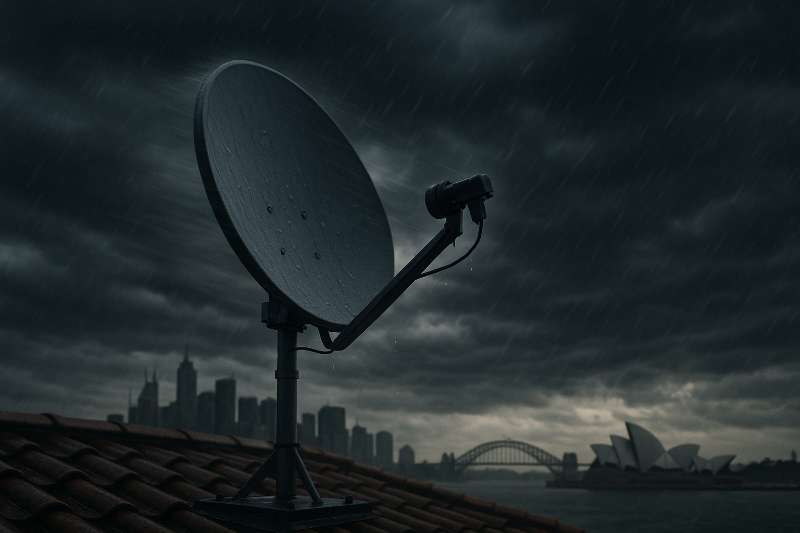As we enter August 2025, Sydney's weather is expected to bring cooler temperatures and occasional rainfall. But how does this weather affect signal performance, and why should businesses care? If you're in telecommunications, satellite services, or broadcasting, understanding the impact of weather on signals is essential for maintaining service quality.
Sydney's Weather Forecast for August 2025
In August, Sydney experiences typical winter weather conditions that can have a direct impact on signal transmission. Here’s what you can expect:
Average Temperatures: Daily highs of around 17°C (63°F) and lows near 9°C (48°F).
Rainfall: About 77 mm of rain spread over 10 days, with occasional downpours and storms.
Wind Gusts: Moderate winds with occasional gusts, especially during storms.
These weather conditions are important to consider, as they can interfere with signal performance and service reliability.
How Weather Impacts Signals: Key Factors
Weather events, especially in Sydney's winter months, can cause significant disruptions to the performance of communication systems. Here's how:
1. Rain and Signal Attenuation
One of the most common weather-related challenges is rain fade. Rain can cause signal degradation, especially in satellite communications. The heavier the rainfall, the more it interferes with high-frequency signals, like those in the Ka-band (used for satellite transmissions). This phenomenon can lead to slower speeds or even signal loss, particularly in more severe weather conditions.
2. Temperature Changes and Equipment Misalignment
Temperature fluctuations in Sydney during winter can cause equipment expansion or contraction, which may misalign antennas. Even slight misalignments can result in degraded signal strength. Ensuring that antennas are calibrated properly to handle these temperature changes can prevent misalignment and service disruptions.
3. Wind Gusts and Antenna Stability
Strong winds, common during Sydney's winter months, can cause antennas to shift or sway, especially if they are not installed securely. This misalignment can result in weaker signals, increased interference, or total signal loss. It's essential to ensure that antennas are properly mounted and securely fastened to prevent these issues.
4. Atmospheric Turbulence and Signal Disturbances
Heavy storms and rainfall often cause atmospheric turbulence, which can affect the propagation of signals. This phenomenon can lead to signal degradation, especially for satellite communication systems, and may cause brief outages. Understanding how atmospheric conditions impact signals can help companies plan for these disruptions and maintain service continuity.
How to Minimize Weather-Related Signal Disruptions
While Sydney’s weather can pose challenges to signal transmission, there are several steps you can take to minimize its impact:
1. Regular Antenna Maintenance and Calibration
Performing regular maintenance and realigning antennas to account for any changes caused by temperature fluctuations or wind gusts can significantly reduce the risk of signal loss.
2. Weatherproof Equipment
Use high-quality, weather-resistant materials and coatings for outdoor equipment. Protecting antennas from moisture, wind, and other elements will help maintain their functionality during adverse weather conditions.
3. Real-Time Signal Monitoring
Implementing real-time monitoring tools allows you to detect issues early and make necessary adjustments. By identifying potential problems quickly, you can prevent prolonged outages or disruptions.
4. Backup Systems for Weather-Related Failures
Investing in backup systems, such as redundant communication pathways or satellite connections, can ensure that services remain operational even during significant weather events.
Why Weatherproofing Your Signals is Crucial for Sydney Businesses
The impact of weather on signals isn't just a theoretical concern. For businesses that rely on continuous communication—whether for customer service, broadcasting, or data transmission—any disruption can lead to lost revenue and customer dissatisfaction. Ensuring your systems are weatherproof and well-maintained can help you avoid costly service interruptions.
Final Thoughts on Weather and Signal Performance in Sydney
Sydney’s winter weather, with its rain, wind, and fluctuating temperatures, can significantly impact signal transmission. By understanding these effects and taking proactive measures to weatherproof your signal systems, you can ensure reliable service all year round.
At Antenna Pros, we specialize in providing reliable signal solutions that can withstand Sydney’s challenging weather conditions. Contact us today to learn more about our signal maintenance services and how we can help improve your satellite and communication systems.



































